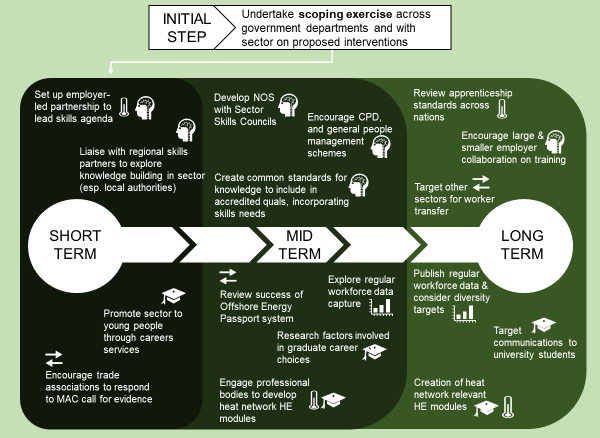At a glance
A fast-paced study exploring the skills needs of the UK heat network sector, at a time where it is expecting rapid growth, and transition to lower temperature heat supply. The study consisted: of a literature review, a skills mapping exercise; 25 depth interviews with industry stakeholders and 4 workshops. The study uncovered existing skills gaps in key project management and technical roles, while it also proposed the creation of an industry-led skills partnership to overhaul the current approach to learning and development.
Challenges and objectives
Heat networks currently service 2% of heat demand in the UK. The Committee on Climate Change has estimated that this figure will however have to increase to 18% by 2050 if the UK is to meet its carbon targets cost-effectively.
There is a risk that the UK heat network supply chain may not attain capability and capacity needed at a pace that keeps up with market growth. This research was therefore commissioned to provide evidence on what supply chain skills are required and what current and future skills gaps exist that might prevent these ambitions from being reached.
Heat networks currently service 2%

Solution
A lack of existing data on sector skills needs underpinned the approach to the research design. An initial literature review and online skills mapping exercise was conducted to explore what limited information was already publicly available. The skills mapping exercise identified the most common occupations, skills requirements for these and career pathways through webscraping of job adverts, conversations with industry stakeholders and analysis of broader energy and engineering sectors where data was available.
The second stage involved primary data collection, consisting of 25 interviews and 4 workshops with membership associations, consultancies, energy service companies (ESCos), local authorities and training providers.

Impact
The review determined that while the industry is relatively well equipped to meet current demand there are particular skills gaps in senior project management and engineering roles. It also unearthed broader diversity issues. There is clear evidence as well that the industry will struggle to meet future capacity and capability needs.
The review therefore proposed five broad goals for the industry:
- Facilitate development of necessary skills within the sector through developing standards and increasing support to smaller businesses and local authorities.
- Develop more specialised heat network skills among new entrants, by adapting degree courses and apprenticeships.
- Encourage the transfer of workers into the sector from elsewhere.
- Increase pool of young and diverse talent entering the sector through targeted promotional activities.
- Improve workforce data metrics in the sector.
Overseeing this work we proposed that the industry form a skills partnership, to work in collaboration with BEIS, other government departments, training providers and accreditation organisations. The pathway illustrated below sets out an imagined vision of how the sector might respond to these proposals.
You can read the full report here.






